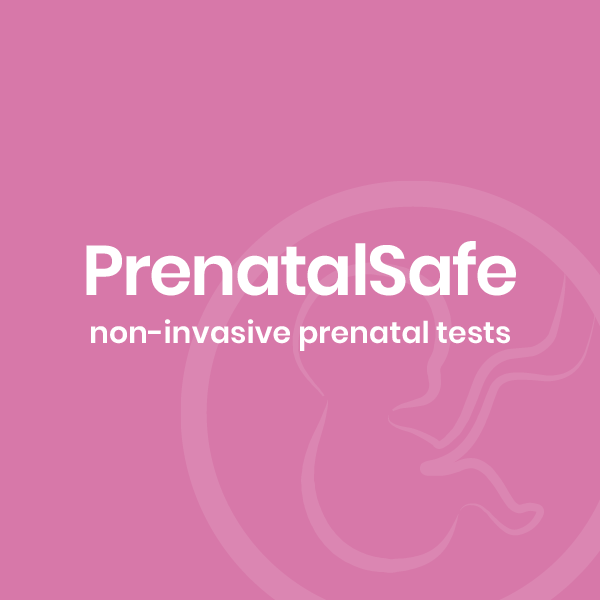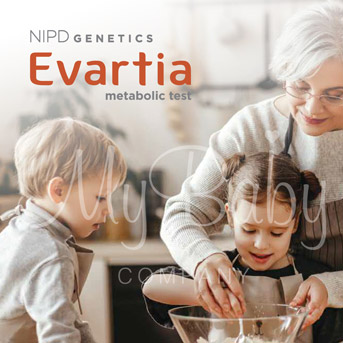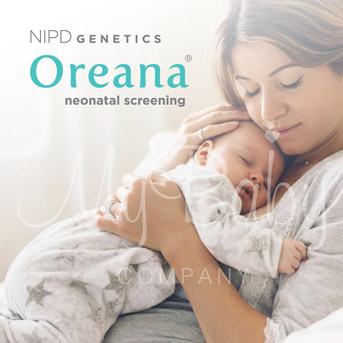PrenatalSafe
£355.00 – £1,855.00
This test is suitable for the expectant mother who wants to screen for the presence of abnormalities in her unborn child, but wants to avoid an invasive procedure
- 10ml blood sample required from the expectant Mother
- FREE gender identification (optional) from 10 weeks of pregnancy
- Results available within 5 – 20 working days of sample arriving in lab depending on complexity of test chosen – please see individual tests for turnaround times
Description
Non-invasive prenatal testing (NIPT), since its introduction into clinical practice over 10 years ago, has positively influenced prenatal diagnosis.
NIPT has established itself as a safe alternative to invasive investigations (ie: Amniocentesis and CVS).
With over 20 years of experience in genetic testing – Prenatalsafe® ensures accurate testing of circulating fetal DNA to investigate the presence of:
- Aneuploidies in all the chromosomes of the fetus
- Deletions and duplications on all chromosomes
- 9 microdeletion syndromes
- Inherited and de novo (mutated) genetic diseases
How Does NIPT Work?
The test is a non-invasive 10 ml blood sample from the mother.
From then sample the test can analyse fetal DNA circulating in the maternal blood to identify the presence of chromosomal abnormalities and genetic diseases in the fetus.
The amount of felt DNA increases during pregnancy and from 10 weeks of gestation is adequate for screening purposes.
The chromosome set (karyotype) comprises of 23 pairs on non-sex chromosomes and 1 pair of sex chromosomes.
Chromosomes are formed from DNA – some DNA segments are defined as Genes and provide the cell with the information to perform its function.
Abnormalities in the delicate process that leads to the formation of sex cells can cause different types of alterations:
- Abnormalities in the number of chromosomes (Aneuploidies)
- Abnormalities in the structure of the chromosomes
Variations in the DNA sequence (Genetic Mutations) can occur. This kind of alteration may be inherited from parents or occur for the first time in the fetus and cause Genetic Diseases.
The frequency of these alterations increases mainly with maternal age, but also advanced paternal age can be a risk factor.
WHY IS NIPT BETTER THAN THE CURRENT NHS COMBINED TEST?
Traditional screening offered during pregnancy is currently called the combined test. This is an ultrasound scan to measure the nuchal translucency (NT) and a blood test. This is much less accurate than NIPT and it only detects around 85% of babies with Down’s syndrome.
The Prenatalsafe test has a higher detection rate (up to 99%) than the current combined test offered to pregnant women. This means that fewer pregnant women will undergo unnecessary invasive follow-up procedures such as amniocentesis or CVS which are stressful, painful and can carry a small risk of miscarriage.
What can be investigated with Prenatalsafe NIPT ?
Abnormalities in the number of chromosomes (Aneuploidies):
Trisomy – 3 copies of a chromosome
Monosomy – single copy of a chromosome
The most common ones:
Trisomy 21 – Downs Syndrome (1 in 700 births)
Trisomy 18 – Edwards Syndrome (1 in 3,000 births)
Trisomy 13 – Patau Syndrome (1 in 6,000 births)
Risk increases with maternal age
Abnormalities in the structure of chromosomes:
Deletion – loss of a chromosome segment
Duplication – doubling of a chromosome segment
*if these rearrangements are very small they are referred to as microdeletions and microduplications.
Microdeletion 22q11.3 is the most common microdeletion and is linked to DiGeorge Syndrome, which has an incidence 1 in 2,000 – 4,000 people, regardless of maternal age
Genetic Diseases
De Novo – caused by DNA mutations that occur for the first time in the fetus
Hereditary – caused by mutations inherited from the parents*
*It is important to test specifically for the possibility of being a Healthy Carrier – that is someone who can transmit the disease but is not affected and therefore has no symptoms.
Free pre-test genetic counselling is available to identify the suitable level of testing for the parents needs
Free post-test genetic counselling is available on receipt of High Risk result
We always recommend that your test results are discussed with your Healthcare Professional
Wide Range Of Test Options:
Prenatalsafe 3 – £355
Gender Identification*
Trisomy 21 – Downs Syndrome
Trisomy 18 – Edwards Syndrome
Trisomy 13 – Patau Syndrome
1 x 10ml Maternal Blood Sample
From 10 weeks of pregnancy
Results available from 5 working days from sample arrival in lab
Suitable for single, IVF, Donor Egg Twin pregnancies
Prenatalsafe 5 – £375
Gender Identification*
Trisomy 21 – Downs Syndrome
Trisomy 18 – Edwards Syndrome
Trisomy 13 – Patau Syndrome
Sex Chromosome Aneuploidies
1 x 10ml Maternal Blood Sample
From 10 weeks of pregnancy
Results available from 5 working days from sample arrival in lab
Suitable for single, IVF, Donor Egg & monochorionic twin pregnancies
Prenatalsafe 5 DiGeorge – £425
Gender Identification*
Trisomy 21 – Downs Syndrome
Trisomy 18 – Edwards Syndrome
Trisomy 13 – Patau Syndrome
Sex Chromosome Aneuploidies
DiGeorge 22q 11.2
1 x 10ml Maternal Blood Sample
From 10 weeks of pregnancy
Results available from 7 working days from sample arrival in lab
Suitable for single, IVF, Donor Egg & monochorionic twin pregnancies
Prenatalsafe Plus – £575
Gender Identification*
Trisomy 21 – Downs Syndrome
Trisomy 18 – Edwards Syndrome
Trisomy 13 – Patau Syndrome
Sex Chromosome Aneuploidies
Rare Autosomal Aneuploidies (9 & 16)
Microdeletions
1 x 10ml Maternal Blood Sample
From 10 weeks of pregnancy
Results available from 7 working days from sample arrival in lab
Suitable for single, IVF, Donor Egg & monochorionic twin pregnancies
Prenatalsafe Karyo – £595
Gender Identification*
Trisomy 21 – Downs Syndrome
Trisomy 18 – Edwards Syndrome
Trisomy 13 – Patau Syndrome
Sex Chromosome Aneuploidies
Rare Autosomal Aneuploidies
Deletions and Duplications
1 x 10ml Maternal Blood Sample
From 10 weeks of pregnancy
Results available from 7 working days from sample arrival in lab
Suitable for single, IVF, Donor Egg & twin pregnancies
Prenatalsafe Karyo Plus – £745
Gender Identification*
Trisomy 21 – Downs Syndrome
Trisomy 18 – Edwards Syndrome
Trisomy 13 – Patau Syndrome
Sex Chromosome Aneuploidies
Rare Autosomal Aneuploidies
Deletions and Duplications
Microdeletions
1 x 10ml Maternal Blood Sample
From 10 weeks of pregnancy
Results available from 9 working days from sample arrival in lab
Suitable for single, IVF, Donor Egg & monochorionic twin pregnancies
Prenatalsafe Complete – £1,295
Gender Identification*
Trisomy 21 – Downs Syndrome
Trisomy 18 – Edwards Syndrome
Trisomy 13 – Patau Syndrome
Sex Chromosome Aneuploidies
Rare Autosomal Aneuploidies
Deletions and Duplications
Inherited Genetic Diseases
De Novo Genetic Diseases
1 x 10ml Maternal Blood Sample
From 10 weeks of pregnancy
Results available from 15 working days from sample arrival in lab
Suitable for single, IVF, Donor Egg & twin pregnancies
Prenatalsafe Complete Plus – £1,495
Gender Identification*
Trisomy 21 – Downs Syndrome
Trisomy 18 – Edwards Syndrome
Trisomy 13 – Patau Syndrome
Sex Chromosome Aneuploidies
Rare Autosomal Aneuploidies
Deletions and Duplications
Microdeletions
Inherited Genetic Diseases
De Novo Genetic Diseases
1 x 10ml Maternal Blood Sample
From 10 weeks of pregnancy
Results available from 15 working days from sample arrival in lab
Suitable for single, IVF, Egg Donor & monochorionic twin pregnancies
Prenatalsafe Full Risk – £1,855
Gender Identification*
Trisomy 21 – Downs Syndrome
Trisomy 18 – Edwards Syndrome
Trisomy 13 – Patau Syndrome
Sex Chromosome Aneuploidies
Rare Autosomal Aneuploidies
Deletions and Duplications
Microdeletions
Inherited Genetic Diseases
De Novo Genetic Diseases
Carrier Screening Test*
*Testing on both parents to see whether they carry mutations related to 30 of the most common genetic diseases
1 x 10ml Maternal Blood Sample
Buccal Cheek Swab for Father
From 10 weeks of pregnancy
Results available from 20 working days from sample arrival in lab
Suitable for single, IVF & monochorionic twin pregnancies
*Please note are unable to provide gender identification in dichorionic twins – Dichorionic means there are two placentas.
Please click here to view the brochure
Please click here to views our FAQs prior to purchasing a Test
You will need to use a ‘private phlebotomy service’ to have your blood drawn (there will be a small charge for this) – a Google search will help you locate your nearest service. Some GP practices offer phlebotomy services however this varies regionally.
This test provider also offer free genetic counselling via a telephone consultation for all high risk test results.
The PrenatalSafe® prenatal test was tested in a multi-centre clinical study, in a population of high risk patients, and the test performance is summarised below.
Positive Predictive Value (PPV) is 99.21% for trisomy 21, 97.14% for trisomy 18, 93.52% for trisomy 13, 71.67% for monosomy X, 88.76% for XXY, 100% for XYY.
The Sensitivity and Specificity of PrenatalSafe® for trisomy 21, trisomy 18, and trisomy 13 are >99%.
Additional information
| NIPT Preferences | |
|---|---|
| Tests available: | PrenatalSafe 3, PrenatalSafe 5, PrenatalSafe 5 Di George, PrenatalSafe Plus, PrenatalSafe Karyo, PrenatalSafe Karyo Plus, PrenatalSafe Complete, PrenatalSafe Complete Plus, PrenatalSafe Complete, PrenatalSafe Full Risk |





